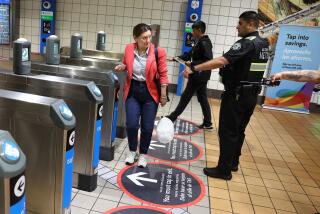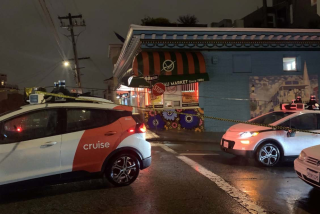N.Y. Subway Fracas Snags San Diego Firm
- Share via
SAN DIEGO — With their tough metal exterior and high-strength security bars, the subway turnstiles that Cubic Corp. has designed for New York City’s least-savory subway stations don’t look very user-friendly.
The stark design of the state-of-the-art, computer-driven gates is in keeping with a mission: stopping wily “fare beaters” who limbo under, vault over or squeeze through the system’s existing turnstiles, cheating the Big Apple’s transit system out of an estimated $70 million each year.
San Diego-based Cubic was the acknowledged front-runner for an initial $105-million contract to replace an aging transit fare collection system.
But last week, the New York state-funded Metropolitan Transit Authority dealt the company a serious blow when it unexpectedly reopened the bidding process. It now appears that Cubic has become entangled in local politics.
New York state is in a budget crunch. Some consumers and politicians in the city are taking potshots at the MTA’s plans, and the MTA board has put its own staff recommendation on hold.
Meanwhile, Cubic officials, who estimate that the automatic fare collection contract could eventually become an estimated $480-million deal, is planning to go to court to stop renewed bidding.
Cubic in March began manufacturing parts for the system, shortly after a transit staff report described the company’s bid as technically equivalent to--but $26 million cheaper than--a competing bid by an international consortium that includes Nynex, the New York-based telephone and computer giant.
But the MTA board set aside the staff recommendation and postponed a scheduled vote on the contract award. Instead, it ordered its staff to seek more information about automatic fare collection systems.
Some observers have suggested that MTA board members were miffed by a March newspaper story that described the scheduled MTA board vote as a simple formality.
MTA spokesman John Cunningham said board members approved “further discussions” with Cubic and Nynex in order to get “the best product for the best price.”
An angry Raymond L. de Kozan, chairman of Cubic’s Automatic Revenue Collection Group, promptly alleged that the decision was a “corrupt (act) . . . that undermines the integrity of the selection process. . . . It’s not a competition; it’s an auction.”
The MTA has directed Cubic and the Nynex team to submit new bids by June 28, but Cubic instead said it will go to court.
The unexpected decision to reopen bidding was the latest in a string of events that have dogged Cubic, which has been chasing the elusive subway contract since the late 1970s.
Cubic has also been under investigation by New York state’s office of the inspector general.
The investigation was sparked by the discovery of five $20 bills that ended up in a report that a Cubic engineer delivered to a transit authority employee. Cubic maintains that the cash belonged to a San Diego-based engineer who simply misplaced his money.
Some New Yorkers have also criticized Cubic’s planned turnstiles as ineffective against fare-beaters. Cubic officials say a turnstile design change has made fare-beating impossible.
While Cubic has been busy with damage control, the MTA has been deflecting growing criticism from consumer groups and elected officials who have questioned the wisdom of spending close to $1 billion for a highly automated fare collection system.
New York State Assemblyman Jerrold Nadler, who chairs an Assembly committee that controls MTA funding, isn’t opposing the acquisition of an advanced fare collection system. But Nadler has questioned why the board is “looking at the most expensive (system) ever proposed. . . . I want to know what they propose to use it for.”
Similarly, Joseph G. Rappaport, a coordinator with the Straphangers Campaign, a nonprofit group that represents New York subway and bus riders, strongly supports a new fare collection system. But Straphangers has conditioned its support on “a real commitment to a pass system,” Rappaport said.
Rappaport and others have criticized transit officials for failing to keep the public informed about the bidding process.
More to Read
Sign up for Essential California
The most important California stories and recommendations in your inbox every morning.
You may occasionally receive promotional content from the Los Angeles Times.













